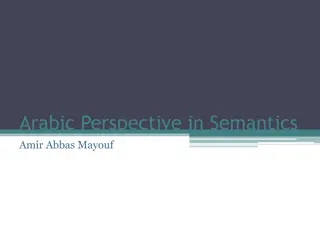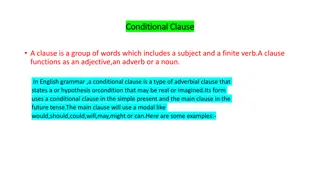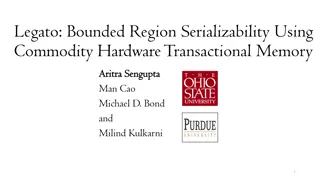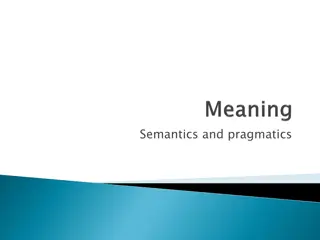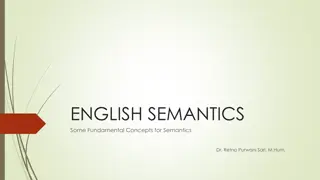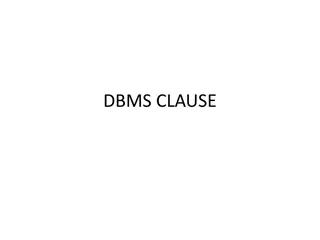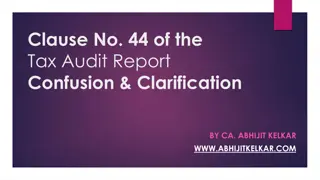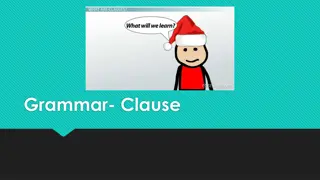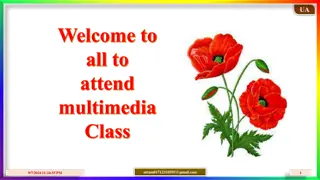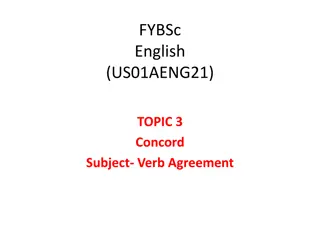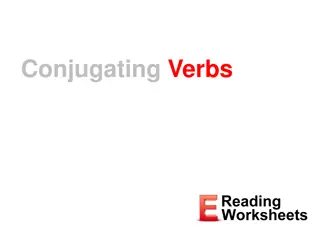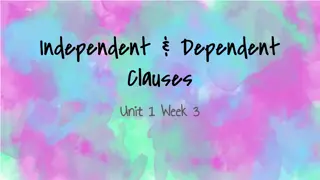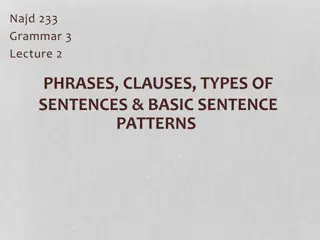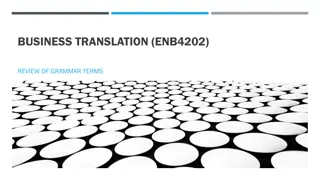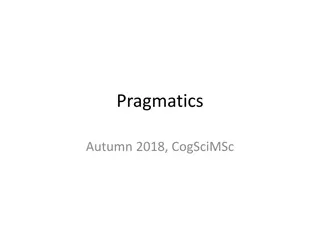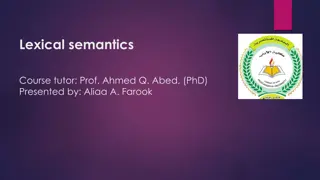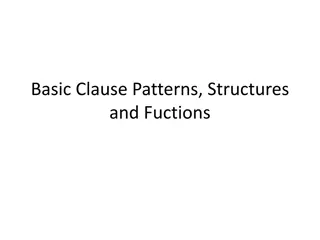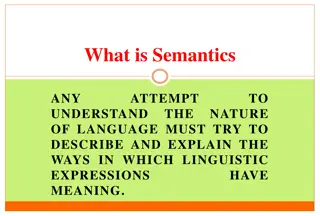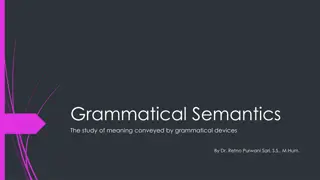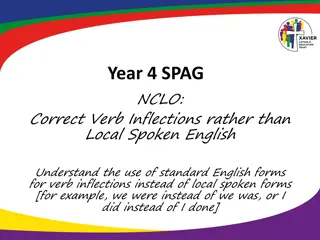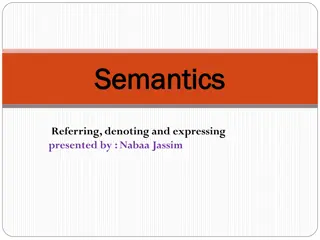Clause Structure and Verb Semantics in Communication Analysis
Exploring the syntax and semantics of clausal complementation, focusing on CPs as subjects in the context of manner of speaking verbs. The discussion delves into MoS verbs like holler, yell, mumble, and shout, analyzing their role in depicting intended acts of communication and the physical characteristics of speech acts. Various properties of MoS verbs such as island effects and complementizer omission are discussed, shedding light on their exceptional nature within linguistic phenomena.
Uploaded on Sep 12, 2024 | 0 Views
Download Presentation

Please find below an Image/Link to download the presentation.
The content on the website is provided AS IS for your information and personal use only. It may not be sold, licensed, or shared on other websites without obtaining consent from the author. Download presentation by click this link. If you encounter any issues during the download, it is possible that the publisher has removed the file from their server.
E N D
Presentation Transcript
CPs as subjects - the view from manner of speaking verbs - Irina Stoica University of Bucharest irina.stoica@lls.unibuc.ro BCGL The syntax and the semantics of clausal complementation 16-18 December 2020
1.Starting point - communication by speech and describing the physical characteristics of the speech act (Zwicky, 1971) MoS verbs (holler, yell, mumble, shout): verbs referring to intended acts of
1.Starting point - communication by speech and describing the physical characteristics of the speech act (Zwicky, 1971) MoS verbs (holler, yell, mumble, shout) verbs referring to intended acts of - verbs of communication MoS verbs have typically been discussed in comparison to (and contrast with)
1.Starting point - communication by speech and describing the physical characteristics of the speech act (Zwicky, 1971) MoS verbs (holler, yell, mumble, shout) verbs referring to intended acts of - verbs of communication MoS verbs have typically been discussed in comparison to (and contrast with) - MoS verbs have been singled out as exceptions to various phenomena
1.Starting point some properties of MoS verbs A) Island effects the mermaids <with which binoculars>? (from Warnasch, 2006) (1) *Who did Mary whisper that John met <who>? (from Cinque 1990) (2) *With which binoculars did the linguist whisper that he watched
1.Starting point some properties of MoS verbs A) Island effects the mermaids <with which binoculars>? (Warnasch, 2006) (1) *Who did Mary whisper that John met <who>? (Cinque 1990) (2) *With which binoculars did the linguist whisper that he watched B) Complementizer omission (3) He chuckled *(that) you were mistaken. (Doherty, 2000)
1.Starting point some properties of MoS verbs A) Island effects the mermaids <with which binoculars>? (from Warnasch, 2006) (1) *Who did Mary whisper that John met <who>? (from Cinque 1990) (2) *With which binoculars did the linguist whisper that he watched B) Complementizer omission (3) He chuckled *(that) you were mistaken. (example taken from Doherty, 2000) C) Double Object Constructions (4) a. I mumbled the answer to John. b. *I mumbled John the answer.
2. The puzzle A) Island effects Stoica, 2017) (5) a. ?What did John mumble that he saw? (Erteschik-Shir, 1973) b. How did Ron whisper to Harry that Hermione solved the mystery <how> ?
2. The puzzle A) Island effects Stoica, 2017) (5) a. ?What did John mumble that he saw? (Erteschik-Shir, 1973) b. How did Ron whisper to Harry that Hermione solved the mystery <how> ? B) Complementizer omission (6) John whined Bill was an undercover agent. (Dor, 2005)
2. The puzzle A) Island effects Stoica, 2017) (5) a. ?What did John mumble that he saw? (Erteschik-Shir, 1973) b. How did Ron whisper to Harry that Hermione solved the mystery <how> ? B) Complementizer omission (6) John whined Bill was an undercover agent. (Dor, 2005) C) Double object constructions (7) Finally a kind few (three to be exact) came forward and whispered me the answer. (Bresnan and Nikitina, 2003)
3. Research questions Q1: Why do MoS verbs behave differently from verbs of communication (at least with respect to the 3 properties mentioned above)
3. Research questions Q1: Why do MoS verbs behave differently from verbs of communication (at least with respect to the 3 properties mentioned above) Q2: How can we account for the apparently variable behaviour of MoS verbs?
3. Research questions Q1: Why do MoS verbs behave differently from verbs of communication (at least with respect to the 3 properties mentioned above) Q2: How can we account for the apparently variable behaviour of MoS verbs? Q3: Do MoS verbs behave the same crosslinguistically?
4. The traditional view A) the semantic route (Erteshick-Shir, 1973; 2005; Ambridge and Goldberg, 2008) - - heavier than the CP extraction is banned - When the manner itself is taken for granted or when is part of the background information, extraction becomes possible MoS verbs are heavier than verbs of communication Extraction is only possible from semantically heavy CPs the MoS verb is (8) What did Truman Capote lips he d do? (Erteschik-Shir, 1972)
4. The traditional view B) The syntactic route (Stowell, 1981; Snyder, 1992) - The CP is not an argument a) The adjunct analysis (Stowell, 1981): (9) John shouted to leave John uttered a shout, conveying the message to leave b) The appositive analysis (Snyder, 1992): (10) [V (make)) ] [ NP (a) [NP grunt]]
5. An alternative approach are MoS verbs truly manner? MoS verbs are defined as verbs referring to intended acts of communication by speech anddescribing physical characteristics of the speech act (Zwicky, 1971)
5. An alternative approach are MoS verbs truly manner? MoS verbs are defined as verbs referring to intended acts of communication by speech anddescribing physical characteristics of the speech act (Zwicky, 1971) Proposal: MoS verbs are not just manner verbs they come in two guises
5. An alternative approach are MoS verbs truly manner? Manner verbs: verbs referring to intended acts of communication by speech (11) Mary whispered that she was scared. Mary said that she was scared, in a whispering manner. verbs of implicit creation: and describing physical characteristics of the speech act (12) John mumbled the answer to the question. John produced a mumble, which was the answer to the question.
5. An alternative approach are MoS verbs truly manner? Verbs of implicit creation (Jezek, 2014) verbs denoting the coming into being of an entity that does not surface as an argument of the verb
5. An alternative approach are MoS verbs truly manner? - Verbs of implicit creation (Jezek, 2014) verbs denoting the coming into being of an entity that does not surface as an argument of the verb (13) translate a book translation paint a landscape a painting braid your hair a braid
5. An alternative approach are MoS verbs truly manner? - Verbs of implicit creation (Jezek, 2014) verbs denoting the coming into being of an entity that does not surface as an argument of the verb (13) translate a book translation paint a landscape a painting braid your hair a braid - Rather, a representation of that object is created, and the object itself does not undergo any change (Dowty, 1979, in Jezek, 2010) Here something is created, but not literally the thing named by the object NP.
5. An alternative approach are MoS verbs truly manner? - Verbs of implicit creation (Jezek, 2014) verbs denoting the coming into being of an entity that does not surface as an argument of the verb (13) translate a book translation paint a landscape a painting braid your hair a braid - Rather, a representation of that object is created, and the object itself does not undergo any change (Dowty, 1979, in Jezek, 2010) Here something is created, but not literally the thing named by the object NP. - Levin, 1993: A number of verbs listed in the various subclasses of verbs of creation and transformation are also found listed as members of other verb classes.
6. An alternative approach syntactic consequences - representations True manner verbs and verbs of implicit creation have different syntactic
6. Same class different syntactic behaviour - behaviour: instrument verbs (hammer vs. tape) different structure different syntactic behaviour Other verbs belonging to the same class have been argued to show variable
6. Same class different syntactic behaviour - representation True manner verbs and verbs of implicit creation have different syntactic - behaviour: instrument verbs (hammer vs. tape) different structure different syntactic behaviour Other verbs belonging to the same class have been argued to show variable
6. Same class different syntactic behaviour - Arad, 2003: word formation is a syntactic process derived from the merger of underspecified roots either directly in a particular category or by merging first into a particular category and then further merging into another head: words can be formed either from roots or from words (15) vP (14) vP v 2 v nP 2 2 n
6. Same class different behaviour - Are zero derived N-V pairs root derived or word derived? - if there are no morphological markers to establish the word formation process, semantics plays a defining role (Kiparsky 1982, in Arad, 2003) (17) vP (16) vP 2 v hammer 2 v nP 2 n tape noun-derived verbs entail the meaning of the noun: i.e. Entity Create/bring - about entity (calve)
7. The syntactic structure of MoS verbs a) Manner verbs they behave on a par with speech act verbs they can be analyzed on a par with hammer-verbs (18) John whispered a secret he said something in a whispery way b) Verbs of implicit creation the meaning of the verb includes the produced sound itself MoS verbs can be analyzed on a par with tape-verbs their root needs to merge into a nominalising head first and then further move to v (19) John whispered a secret John produced a whisper (which was a secret)
7. The syntactic structure of MoS verbs - Marantz (2005): activities can appear in a variety of frames they can have different structures - 2 positions for root merge: a) directly with v event modifiers b) the head of v s complement part of a small clause DOs are a) complements of v if the root merges into v b) an external argument of the activity predicate ; i.e. an inner subject
7. The syntactic structure of MoS verbs a) Manner verbs b) Verbs of implicit creation (20) vP 2 v /DP/CP whisper that he loved her (21) vP 2 v SC 2 /CP/DP nP that he loved her 2 n whisper
7. The syntactic structure of MoS verbs A. Island effects extraction is banned out of a subject position but allowed from a complement one True manner verbs: (22) Who did John whisper to his friend that Mary loved? Verbs of implicit creation: (23) *Whom did John grunt that Mary likes t? (Snyder, 1992)
7. The syntactic structure of MoS verbs B. Complementizer omission null C is not possible in subject clauses True manner verbs: (24) John whined Bill was an undercover agent. (Dor, 2005) Verbs of implicit creation: (25) He chuckled *(that) you were mistaken. (Doherty, 2000)
7. The syntactic structure of MoS verbs C. DOC change of state/possession is encoded only in the event-modifier frame True manner verbs can be interpreted as change of possession (of information) Verbs of implicit creation no such interpretation arises
8. Conclusions - incompatible with DOC MoS verbs are typically said to induce island effect, to ban null C and to be
8. Conclusions - incompatible with DOC - MoS verbs seem to evince variable behaviour MoS verbs are typically said to induce island effect, to ban null C and to be
8. Conclusions - incompatible with DOC - MoS verbs seem to evince variable behaviour - MoS verbs come in two guises: true manner verbs vs. verbsof implicit creation MoS verbs are typically said to induce island effect, to ban null C and to be
8. Conclusions - incompatible with DOC - MoS verbs seem to evince variable behaviour - MoS verbs come in two guises: true manner verbs vs. verbsof implicit creation - This dichotomy translates into distinct syntactic structures a) manner verbs: the root merges with the v event modifier the CP is an argument b) verbs of implicit creation: the root merges as the head ofa SC the CP is in a subject position MoS verbs are typically said to induce island effect, to ban null C and to be
9. Some advantages - Reconciliation of the semantic and syntactic analysis
9. Some advantages - - Reconciliation of the semantic and syntactic analysis An account for the ban on extraction, null C and the incompatibility with DOC
9. Some advantages - - - Reconciliation of the semantic and syntactic analysis An account for the ban on extraction, null C and the incompatibility with DOC An account for the so called exceptions
9. Some advantages - - - - Reconciliation of the semantic and syntactic analysis An account for the ban on extraction, null C and the incompatibility with DOC An account for the so called exceptions Starting point for a discussion of MoS verbs in other languages i.e. do MoS verbs come in two guises in those languages where the N-V pair is not zero derived? Romanian: a opti(V) / oapt (N) Pe cine ai ipatc ai auzit intr nd in cas ? ?Unde ai morm itc ai g sit cadourile?
Thank you Questions and suggestions are welcome in the Breakout Room
Selected references Ambridge, B., Goldberg, A. E. 2008. The island status of clausal complements: Evidence in favour of an information structure explanation. Cognitive Linguistics 19(3): 349 381. Arad, M. 2003. Locality constraints on the interpretation of roots: the case of Hebrew denominal verbs. Natural Language and Linguistic Theory 21, 737 778. Cinque, G. 1990. Types of A-Dependencies. Cambridge, Mass.: MIT Press. Doherty, C. 2000. Clauses without 'that': The Case for Bare Sentential Complementation in English. New York: Garland. Dor, D. 2005. Toward a semantic account of that-deletion in English, Linguistics 43 (2): 345 382. Erteschik-Shir, N. 1973. On the Nature of Island Constraints. PhD Dissertation, MIT. Erteschik-Shir, N. 2005. Bridge phenomena. In M. Everaert and Henk van Riemsdijk (eds.) The Blackwell Companion to Syntax, Vol.1, 284 294. Oxford: Blackwell. Harley, H., 2005. How do verbs get their names? Denominal verbs, manner incorporation, and the ontology of verb roots in English. In N. Erteschik-Shir and T. Rapoport (eds.) The Syntax of Aspect, 42 64. Oxford: Oxford University Press. Harley, H. (2014). On the identity of roots. Theoretical Linguistics 40.3: 225-276. Jezek E. 2014. Classes of Creation Verbs. In: Simone R., Masini F. (eds). Word Classes: Nature, Typology, Computational Representations. Amsterdam Philadelphia: Benjamins, p. 37-50. Kogusuri, T. 2009. Manner of speaking verbs and their clausal complements, English. Tsukuba English Studies 27: 187 203. Levin, B. 1993. English Verb Classes and Alternations. Chicago/London: The University of Chicago Press. Levinson, L. 2007. The Roots of Verbs. Doctoral dissertation, New York University. Marantz, A. 2005. Objects out of the lexicon! Argument-structure in the syntax. Handout, University of Connecticut Linguistics Colloquium, April 2005.
Mufwene, S.S. 1978. English manner-of-speaking verbs revisited. Papers from the Parasession on the Lexicon, 278 289. Chicago, IL:CLS. Pesetsky, D. 1996. Zero Syntax. Experiencers and Cascades. Cambridge. Mass: MIT Press. Ross, J. R. 1967. Constraints on Variables in Syntax. Doctoral dissertation, MIT. Snyder, W. 1992. Wh-extraction and the lexical representation of verbs. Ms. MIT, 6 May 1992. Stoica, I., 2015. The relationship between lexical semantics and syntactic representation: The view from manner of speaking verbs. Paper presented at the 15th International Conference of the Department of Linguistics, Faculty of Letters, University of Bucharest, November, 27-28, 2015. Stoica, I. 2016. Communicative use effects on syntactic islandhood: The view from manner of speaking verbs. Paper presented at the 14th Conference on British and American Studies, Transilvania University of Bra ov May, 13-14, 2016. Stowell, T. 1981. Complementizers and the Empty Category Principle. In V.Burke and J. Pustejovsky (eds.) Proceedings of the Eleventh Annual Meeting of the North Eastern Linguistic Society, 345 363. Amherst, Mass.: GLSA. Warnasch, C. 2006. Discriminate and conflate: Two classes of English non-bridge verbs. Ms. New York University. Zwicky , A.M. 1971. In a manner of speaking. Linguistic Inquiry 2 (2): 223 232.


